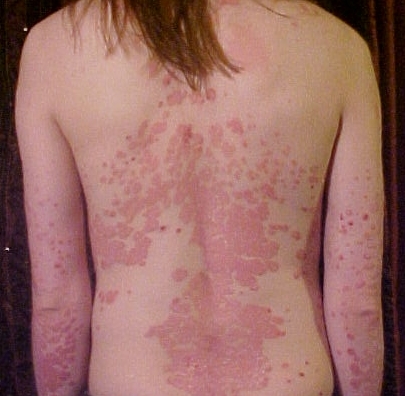Psoriasis Facts For Kids
Psoriasis is a long-lasting, noncontagious autoimmune disease characterized by patches of abnormal skin, often red and scaly.
Set reading age
View for Kids
Easy to read and understand
View for Students
Clear, detailed explanations
View for Scholars
Deep dives and big ideas
Introduction
Psoriasis is a skin condition that makes some people’s skin look red and scaly 🌟. It happens when the body’s defense system, called the immune system, works a little too hard. This causes skin cells to grow super quickly – much faster than normal! Most people with psoriasis can have it for a long time, but it isn’t contagious, which means you can’t catch it from someone else 🤝. In this article, we’ll learn about different kinds of psoriasis, how to spot it, what causes it, and how people can live happily with it!
Gallery of Psoriasis Facts For Kids
Treatment Options
There are many ways to treat psoriasis, depending on how severe it is. Some people may use creams and ointments that help reduce redness and scaling, known as topical treatments 🌱. Other treatments might include light therapy, where ultraviolet light helps the skin, or medications taken by mouth or injection that help the body’s immune system. It's important to remember that a healthcare provider will find the best treatment that suits each individual’s needs.
Symptoms And Signs
Common signs of psoriasis include red patches of skin covered in silver or white scales 🩹. People might also experience itching, burning, or soreness in these areas. Sometimes, the skin might crack and bleed too. Other symptoms can include thickened nails or patches on the scalp. If anyone sees these signs happening on their skin, it's essential to tell a parent or doctor so they can help! Remember, spotting psoriasis early can make it easier to manage 💖!
Types Of Psoriasis
There are several types of psoriasis, and some are more common than others! The most common type is called plaque psoriasis, which shows up as raised, red patches covered by silvery-white scales. Another type, called guttate psoriasis, often affects kids and appears as small, spots 💧. Then, there’s inverse psoriasis, which appears in folds of skin, like under the arms. Lastly, there’s psoriatic arthritis, which can make joints hurt. Knowing the type of psoriasis can help doctors give the best treatment 🏥!
What Is Psoriasis?
Psoriasis is a long-lasting condition where the skin forms patches that are often itchy and may hurt 😣. These patches are formed when new skin cells grow too quickly and pile up. Usually, skin cells take about a month to grow and be pushed to the surface, but in psoriasis, this takes only about 3-5 days! That’s why it can make people feel uncomfortable. It’s important to remember that psoriasis isn’t a sickness like a cold; it’s a part of the immune system being a little confused 🌀.
Living With Psoriasis
Living with psoriasis can be a journey, but many people find ways to manage it and enjoy their lives 🎈. It can help to follow a healthy lifestyle, including eating well, staying active, and reducing stress! Connecting with others who have psoriasis can also be supportive—doing fun activities and sharing experiences helps everyone feel included. Many individuals have successful stories about living with psoriasis, proving they can still have fun and be happy despite their condition!
Diagnosis Of Psoriasis
To figure out if someone has psoriasis, doctors will look at the skin closely. They might ask questions about family history and when the symptoms started. Sometimes, a doctor might perform a skin biopsy, where they take a tiny piece of skin to look at under a microscope 🔬. This helps them see if it’s psoriasis or another skin condition. The good news is that seeing a doctor is important because they can provide the right help!
Causes And Risk Factors
The exact cause of psoriasis isn't entirely understood, but researchers think it has to do with how a person's immune system works! People with a family history of psoriasis may have a higher chance of getting it. Some things, called triggers, might cause psoriasis to flare up 🚨! Stress, certain infections, or even skin injuries can be triggers. Knowing what might make it worse can help people with psoriasis avoid those situations and feel better sooner.
Psoriasis And Mental Health
Having psoriasis can sometimes affect how people feel inside 😟. It can make some feel sad, anxious, or less confident because of how their skin looks. It's super important to talk openly about feelings and seek help if needed. Friends, family, or even therapists can provide support and understanding. Mental health is just as important as physical health, and finding ways to stay positive can help people with psoriasis live their best lives!
Research And Future Directions
Researchers are constantly working to improve treatments for psoriasis and understand it better 🔍. They study why some people get psoriasis and how to make existing treatments more effective and easier. New therapies are being discovered all the time! Many scientists are also exploring the link between psoriasis and other health issues, like heart disease. By studying psoriasis, we can help everyone manage their skin better, so they can live happily! 🧪
Psoriasis Facts For Kids Quiz


Make things. Learn new skills. Share safely.
DIY is a creative community where kids draw, build, explore ideas, and share.
No credit card required

